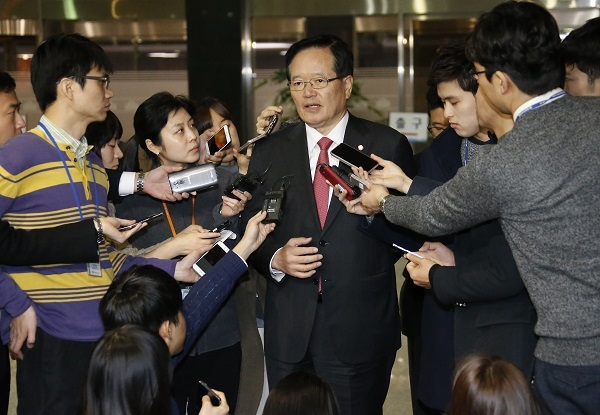Once again, election season is high. The forthcoming April general election to constitute the 20th National Assembly will be a race for parliamentary seats as well as a prelude to the 2017 presidential election.
The rival parties are mired in a power struggle of their own as their eyes are singularly set on individually and collectively winning the next Assembly seats, the configuration of which is likely to decide the fate of the incumbent administration’s initiatives to cope with the approaching lame duck period of President Park Geun-hye.
Slews of populist pledges for each constituency are anticipated without a fundamental chance to address the engrained regionalism, while the grave economic outlook and the unstable security front could fan the ideological division that has often worked as an easy political tool to galvanize each of their supporters.
 |
National Assembly Speaker Chung Ui-hwa speaks to reporters on Thursday. Yonhap |
The heavy political calculations have even led to an unprecedented expiration of legal electoral maps, with the National Election Commission being forced to offer a grace period for the parties to agree on how to redistribute the constituencies.
For the ruling party, the key task is to overcome the slipping approval rate of incumbent President Park Geun-hye, who will enter her fourth year in office in late February, all amid of an escalating power struggle between Park’s supporters and the “non-Parks.”
But their dilemma may be nothing compared to that of the main opposition Minjoo Party of Korea. While struggling to keep itself from falling apart, the party also has to publicize its new agenda and identity to the public, with less than four months remaining to the election.
Marking out the 2016 elections is the appearance of a new political power group other than the two leading parties.
“The new party will embrace ‘rational reform’ instead of ‘old progressivism’ and ‘reactionary conservatism,’” former opposition cochairman and onetime independent presidential candidate Rep. Ahn Cheol-soo said Sunday, revealing his blueprint for the political party that he is to kick off.
“Neither the developmental dictatorship of the 1970s nor the activist paradigms of the 1980s may solve the incumbent problems of our times,” he said, referring to the Park Geun-hye administration and the opposition party respectively.
It remains to be seen whether the information technology guru-turned-politician will succeed this time as a true third force, and not repeat his failed positioning ahead of the 2012 presidential election.
Ahn’s move, regardless of its success, poses a threat to the Minjoo Party, which needs unity in order to stand up against the ruling camp.
The party holds 119 out of 300 seats in the National Assembly. This is already lower than the 120 seat baseline the party considers necessary in order to hold blocking power in the parliament, but is likely to fall further in the coming weeks. While eight lawmakers have left the party since Ahn’s defection, a group of senior members including former floor leader Rep. Park Jie-won have been hinting at their imminent defection.
Struggling to hold the party together, the leadership decided to hold a national convention as soon as possible and prepare for the general election.
The ruling Saenuri Party may be faring better than the opposition camp, but is getting increasingly caught up in its candidate nomination rules, an issue which has divided the pro-Park faction against others.
The party’s nomination committee is pushing ahead with a recommendation system which, according to dissenters including party leader Kim, will enable the leadership to favor specific candidates.
The two groups are also at odds on whether or not to offer extra credits to former government officials running for their first parliamentary office, with the pro-Park faction in favor of the idea and the non-Park group against it.
At the heart of the problem is the unstable public polls of President Park Geun-hye, a factor that has divided her close aides and those who wish to stand apart from the group. The average approval rating of the president has remained in the low 40 percent range over the past few months, according to leading pollsters.
By Bae Hyun-jung(
tellme@heraldcorp.com)







![[Today’s K-pop] Blackpink’s Jennie, Lisa invited to Coachella as solo acts](http://res.heraldm.com/phpwas/restmb_idxmake.php?idx=644&simg=/content/image/2024/11/21/20241121050099_0.jpg)
